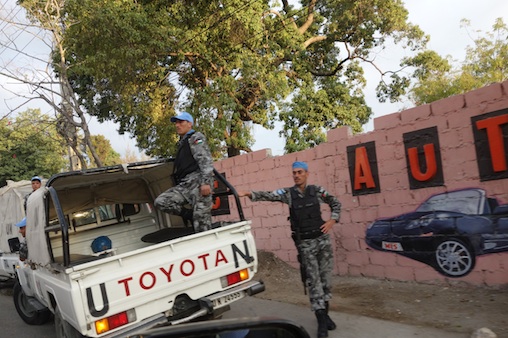Above: UN peacekeepers in Port-au-Prince (CJ Photo)
By the Caribbean Journal staff
Haiti has presented its national plan to eliminate cholera on the island of Hispaniola.
The government said the $2.2 billion plan, which was officially launched Wednesday, is “national in scope and will be implemented across the entire country.”
It calls for $485.9 million in investments during the next two years. Of that amount, $81 million will seek to improve drinking water systems; another $60 million will go toward wastewater and excreta disposal and $74 million for capacity-building of Haiti’s National Water and Sanitation Department.
The “National Plan for the Elimination of Cholera in Haiti” covers the years 2013 to 2022.
Its release comes after Haiti President Michel Martelly and then-Dominican Republic President Leonel Fernandez last January announced a commitment to eliminate the disease in Haiti and the Dominican Republic.
It will be implemented “under the supervision of a high-level national steering committee composed of all social sector ministries as well as the Ministry of Finance,” according to the plan’s presentation document.
It targets four major areas, according to Public Health Minister Florence Guillaume: water and sanitation, epidemiological surveillance, health promotion for behaviour change and the care of infected persons in health institutions.
“Today, the Haitian government is giving us the opportunity to do what needs to be done. This plan when implemented can and will finally halt cholera transmission in Haiti and ensure that any future introduction of the disease can be quickly controlled,” said Dominica native Carissa Etienne, director of the Pan American Health Organization. “But for the plan to be implemented, Haiti’s friends in the international community must align their efforts and harmonize around this plan and provide the necessary financial resources.”
Etienne announced that the PAHO and the WHO would pledge $500,000 in funds to install water and sanitation connections in primary health care facilities.
Cholera has infected nearly 650,000 people and killed more than 8,000 people in Haiti since October 2010. Most studies have theorized that the disease was brought to the country by UN peacekeepers from Nepal.
Earlier this week, UN Secretary General Ban Ki-moon said that the UN would not offer damages to the victims, calling claims involving cholera “not receivable.”
While Haiti said that the threat of cholera “remains real,” the intensity of its transmission has vacillated over the last year, following an 80 percent reduction in the first 33 weeks of last year.
The rate of cases grew in the last seven weeks of 2012, to 21,509 cases from 14,765 in the same period.
The number of deaths also grew in that timeframe, with 230 compared to 100 in 2011.
Cases began to drop again in 2013, however, but the number of deaths actually increased in the same period.
For the full presentation, click here.
